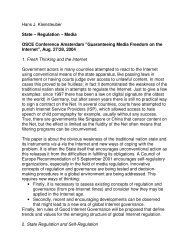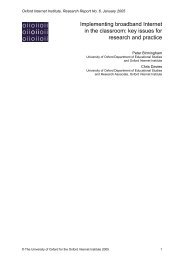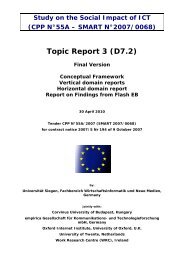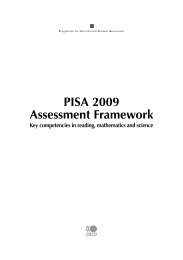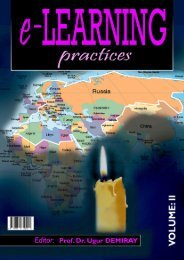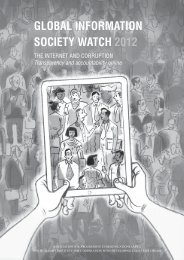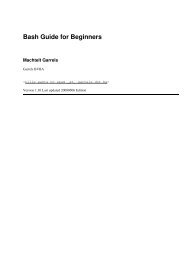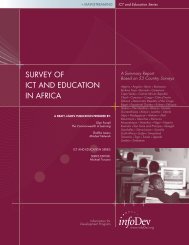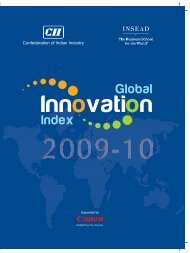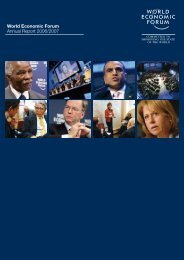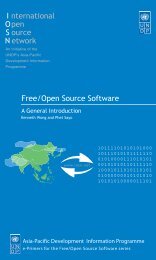You also want an ePaper? Increase the reach of your titles
YUMPU automatically turns print PDFs into web optimized ePapers that Google loves.
18 ❘ FREE/OPEN SOURCE SOFTWARE: LOCALIZATIONMove fast. It is important to have things done correctly, but it is also important to do them quickly.Writing a good computer glossary for a low-technology language can take over a year, but a first glossarythat will suffice for translating the first versions of the programs can be done very quickly (e.g., in threemonths). Future versions of the programs will use the final glossary, but first versions can be availablewithin months. An official “portal” detailing the prescribed terminology and standards should be the firstpriority.Encourage the distribution of FOSS operating systems, applications and platforms. With little cost,governments can distribute localized FOSS to schools, businesses and other organizations. This wouldjumpstart the rate of adoption of computers and software in general, and prevent the unnecessary illegalcopying of proprietary software. Because FOSS often works with older machines, the total price ofproviding computing access to the masses would be lower than that for any other approach.Provide FOSS training not only for computer professionals, but also in primary and secondary schools. Indeveloping countries where educational budgets are stretched thin, the use of localized FOSS operatingon low-cost computers is well suited for increasing educational opportunities in rural communities. Thenatural curiosity of the youth should quickly result in a new generation that knows how to use computersin their native language. Those students who show a special talent for using computers can be encouragedto learn programming through scholarships, contests and other age-appropriate activities.Beyond establishing governmental purchasing policies that favour localized FOSS, governments havean important role in removing obstacles, providing funding and coordinating standards. Withoutgovernmental support, “anglicisms” and inconsistencies will severely hamper the continued localizationof FOSS, and limit the possibilities for growth of an indigenous software industry.Skills and Tools Required for Localization ProjectsLocalization often occurs when the country is already using computers in a foreign language. Computerscientists and trainers are used to an English or French computer vocabulary. Localization thereforerequires creating training materials based on the language used in the glossary, so that trainers and newusers will start using the local language.As it is difficult to engage linguists, preparatory work can be done first, such as looking for differenttranslation options for each term.After this, the work is mainly that of translators, who follow glossary guidelines and rules. There shouldbe professional translators and computer scientists in the same team to assure linguistic and technicalcorrectness of the terms used.Localization can increasingly be performed without too many technical resources, once the first layer ofthe work is done (fonts, language support, etc.). In the future, it will become easier, since almost all FOSSprojects are adopting new tools and techniques to make it easier for non-experts to perform the work.The skilled workers who can perform software localization are often already available, or can be trainedlocally or abroad. Regional software localization training and coordination centres could act as clearinghousesand colleges for individuals to improve their skills, and thereby produce new workers for theyears ahead. Fortunately, only the programmers need to have specialized knowledge of FOSS. The otherprofessionals can have previous experience with any type of software.Office space that is sufficient and appropriate for the work at hand is a must for any project where workis not distributed ad hoc around the world. For a professional localization effort, and especially formultilingual regional localization centres, a commercial space is best. This includes stable low-costbroadband connections to the Internet, LAN and development servers, sufficient client computers foreach employee and three or four terminals for each tester.Active participation and cooperation from universities, especially linguists and translators of English,should be solicited. Publishing rights for scholars who make significant contributions to technicaldictionaries and standards should be granted, as well as public recognition for student volunteers.Typically, the following people need to be trained, organized and provided with the tools to succeed:Project managers – technical and translation.



